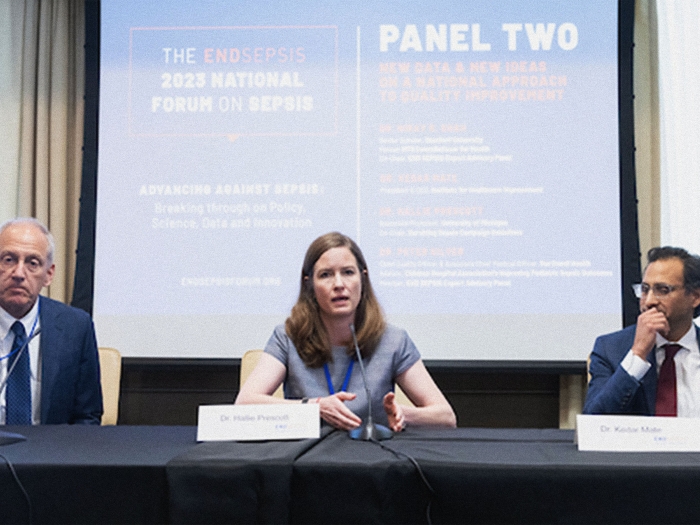FDA links rare cancer to textured breast implants and urges women to monitor themselves for possible symptoms.
2:15 PM
Author |

Many women have breast implants with no serious complications, but textured implants manufactured by Allergan are now considered too risky for patients.
Allergen announced a global recall of the macro-textured implants that have been linked to a rare type of cancer, breast implant-associated anaplastic large cell lymphoma (BIA-ALCL).
The Food and Drug Administration is not recommending that people who already have the textured implants get them removed unless they are having problems.
But women are being urged to stay vigilant about changes in their bodies as cases of the rare cancer grow.
The FDA requested the recall after new data showed a "significant increase" in cases since their last report in February.
LISTEN UP: Add the new Michigan Medicine News Break to your Alexa-enabled device, or subscribe to our daily audio updates on iTunes, Google Play and Stitcher.
"This action indicates that the connection between implants and this problem is real," says Paul Cederna, M.D., chief of plastic surgery at Michigan Medicine, who has promoted the use of registries for maintaining breast implant surveillance as well as informed consent discussions between patients and their doctors.
This spring, a FDA advisory committee met to hear testimony about the safety of implants.
Benefits and risks
But the benefits and risks of breast implants have been on the forefront of plastic and reconstructive surgery discussions for years.
The link between breast implants and the disease was first reported in 1997. Overall, according to the FDA, there have been 573 cases of breast implant-associated anaplastic large cell lymphoma and 33 patient deaths worldwide.
"This is not a breast cancer, but a rare and treatable T-cell lymphoma — a cancer of the cells of the immune system — that usually develops as a fluid swelling around breast implants," says Cederna, a past president of the Plastic Surgery Foundation.
Experts say the cancer is considered treatable if found early enough, with surgery to remove the implants and any masses, and possibly chemotherapy or radiation if the disease has spread.
The American Society of Plastic Surgeons (ASPS) worked closely with the FDA in creating a registry to track cases of BIA-ALCL in 2012. Last year, the organization created a National Breast Implant Registry.
The registries, including the PROFILE registry, which collects data about new cases of BIA-ALCL may provide more information about the condition and who's most at risk.
Nearly 314,000 people received breast implants in 2018, according to the ASPS. The breast augmentation procedures were for post-cancer reconstruction and, more frequently, breast enhancement reasons alone.
Textured surfaces
BIA-ALCL occurs most often in patients who have breast implants with textured surfaces.
Textured implants are designed to disrupt the organization of surrounding tissue to prevent hardening of the breast. For this reason, some patients and surgeons believe they get superior results.
Allergen is the only manufacturer to recall its textured implants, but there are other makers and types of textured implants. The micro-cell implants have microscopic texturing and "it remains to be seen if they are safe or not," says Cederna, the Michigan Medicine surgeon.
Textured implants are used in hospitals and clinics worldwide; however, French authorities have taken them off the market. At Michigan Medicine, textured implants have not been used in more than a decade.
SEE ALSO: Risks, Outcomes Differ Depending on Breast Reconstructive Surgery Type
"Michigan Medicine has not put in a textured implant in over 15 years, and I probably haven't placed one since 2000, 2001," says Cederna, who specializes in reconstructive surgery.
During his plastic surgery foundation leadership meeting in 2016, textured implants were discussed as a top issue, he says. The organization worked to raise awareness among physicians by hosting webinars, having panel talks and creating fact sheets.
"We had editorials in medical journals," he says. "We talked about it everywhere we could."
MORE FROM MICHIGAN: Sign up for our weekly newsletter
In 2018, Michigan Medicine decided to directly inform patients under its care who had received a breast implant at the hospital, or from another health care provider, to monitor their breast implants and to call their physician if they noticed any changes.
Those changes can include pain, swelling or any unusual symptoms in or around the breast implant. A couple of other hospitals have made similar moves.
"We need to be sure everyone is informed about the disease and its symptoms and provide the best care possible," Cederna says. "It's the right thing to do."
He urges women with implants to continue with routine monitoring, mammograms and self-breast exams and to contact their plastic surgeon if they have any concerns.
To learn more from the Plastic Surgery Registries Network: What Patients Should Know About BIA-ALCL.
Michigan Medicine patients with BIA-ALCL symptoms can call the Plastic Surgery Team at 734-998-6022 or toll-free at 877-863-6267 to set up a time to talk to a physician.

Explore a variety of healthcare news & stories by visiting the Health Lab home page for more articles.

Department of Communication at Michigan Medicine
Want top health & research news weekly? Sign up for Health Lab’s newsletters today!





